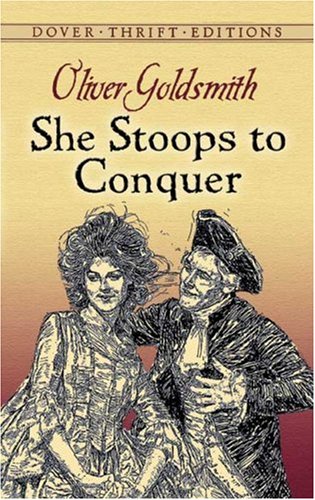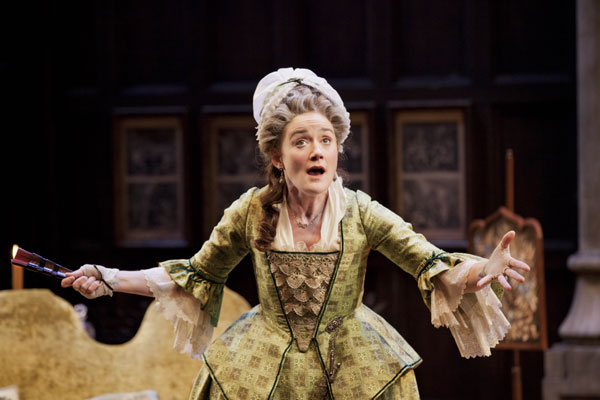
Although Kate never opposed her father for choosing for her a suitor believing it was the best thing to do, Tony could not tolerate such a thing (Goldsmith 121). There is a generational change in this society because the children have decided to change the old tradition of sitting down and letting their parents have a say on their marriage matters. However, the intention of Mrs Hadcastle to compel her son to marry a lady of her choice flopped. The same thing was done by Tony’s mother who had insisted that her son Tony had to marry Constance.

That justifies why he had to organise for a marriage between his daughter Kate and Marlow.

People like Sir Hardcastle believed that their children had no choice rather than marrying from the families which they had chosen for them. The element of classism features when the parents tend to organise for the marriage of their children along class lines. As already hinted, class wars were one of the major themes in the comedy. The desires and actions of each of the characters is a clear proof that the society was not static, but a dynamic one. The events which took place in the play show that the society was a complicated one. How the Play deals with Changes in the Society The purpose of this paper is to discuss the element of change and the role of Tony Lumpkin in the comedy. This is a very interesting and thought-provoking comedy which addressed the themes of change, deception, classism, and conflict. As the story unfolds, new developments take place when Tony rejects his proposed marriage with Neville who ends up hooking up with Hasting with whom he later engages and plans to elope. After deliberately choosing to mislead the two, Tony gets entangled in the marriage affair. Kate Hardcastle was supposed to marry Marlow. The story begins when Tony meets Hastings and Marlow who were to come to the Hardcastle for an arranged marriage visit. The play which was initially titled Mistakes of a Night, presents a story which features around Sir Charles Marlow, his family members and accomplices including Mr Hardcastle, Mrs Hardcastle, Miss Kate Hardcastle, Tony Lumpkin, George Hastings, and Miss Constance Neville.

I’d like to think that how I would have found it if I’d not seen the recent NT version, but I guess we’ll never know.She Stoops to Conquer is a play which Oliver Goldsmith wrote and premiered in London in 1773. Owen Sharpe was rather personable as Tony and Nigel Cooke’s cranky old Marlow was fun but overall, I found this She Stoops To Conquer to be rather flat and pedestrian. I found Christopher Staines’ Marlow and Fritha Goodey’s Constance to be rather anaemic, both in their interactions with their lovers, which is the driving force of the show, and with their respective friends, which gives the show its heart.

But circumstances and the mischievous Tony conspire to have lots of fun with the visitors whilst determined Kate endeavours to make sure this is a match that will be good for her.įrom these four central roles, Monica Dolan’s Kate and Stephen Beresford’s Hastings both shine with assured comic performances, but it is a shame that they’re not a couple in the show. When a suitable suitor, Marlow, is identified, he is invited to down to meet Kate and brings his friend Hastings, who just happens to be entangled with Kate’s cousin Constance. Thick accents and a lack of social graces characterise Ian Redford’s gently frustrated master who wants to marry his daughter Kate off and Jane Wood’s insufferable mistress who longs for society. Goldsmith’s comedy of errors takes place in and around the Hardcastles’ country pile, which in this version in located somewhere in the Black Country. Fortunately this was the only really obvious tinkering and once the play proper had started, the actors were mainly left to get about their business. Things get off to a sticky start as Jason Watkins’ manservant is lumbered with an awkward prologue which tries, and fails, to work in modern-day references effectively. But it it just felt quite tamely traditional for the most part – entirely by comparison it must be said – and misguided in the few attempts at updating it did try. I got round to watching it, primarily due to the thrill of finally getting to see Monica Dolan on stage in Chalet Lines at the Bush Theatre, but truth be told I should have waited, a lot longer.įilmed at the Theatre Royal Bath, Max Stafford-Clark’s production is far from unwatchable and is really quite good at times. This DVD of the 2003 Out of Joint/National Theatre co-production of She Stoops to Conquer has lingered in my to-watch pile for a wee while now, as the memory of the current Jamie Lloyd production at the National has remained strong. “My chief aim is to take my gentleman off his guard”


 0 kommentar(er)
0 kommentar(er)
